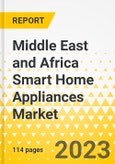Secondly, the focus on energy efficiency and sustainability is contributing to the growth of the smart home appliances market in the MEA region. Governments and consumers alike are becoming more environmentally conscious, leading to a demand for energy-efficient appliances that can contribute to reduced energy consumption.
Thirdly, advancements in connectivity infrastructure, including the widespread availability of high-speed internet and the proliferation of smart devices, are creating an ecosystem conducive to the growth of smart home appliances. The increasing penetration of smartphones and the expansion of reliable communication networks are essential enablers for the seamless functioning of smart home ecosystems. As connectivity becomes more pervasive, consumers in the MEA region are embracing the convenience and automation that smart home appliances offer, further propelling the market's growth.
Market Segmentation:
Segmentation 1: by End-User
- Residential
- Commercial
Segmentation 2: by Appliance Type
- Smart Refrigerator
- Smart Air Purifiers
- Smart Dishwashers
- Smart Washing Machines
- Smart Cookers and Ovens
- Others
Segmentation 3: by Technology
- Wi-Fi
- Bluetooth
- Others
Segmentation 4: by Country
- South Africa
- Saudi Arabia
- Egypt
- UAE
- Turkey
- Rest of Middle East and Africa
Key Market Players and Competition Synopsis
The featured companies have been meticulously chosen, drawing insights from primary experts and thorough evaluations of company coverage, product offerings, and market presence.Some prominent names established in this market are:
- Samsung Electronics
- LG Electronics
- BSH Home Appliances Group
- Electrolux
- Haier
- Gree Electric Appliances Inc.
Key Questions Answered
- What are the main factors driving the demand for Middle East and Africa smart home appliances market?
- What are the major patents filed by the companies active in the Middle East and Africa smart home appliances market?
- What are the strategies adopted by the key companies to gain a competitive edge in Middle East and Africa smart home appliances industry?
- What is the futuristic outlook for the Middle East and Africa smart home appliances market in terms of growth potential?
- Which end-user, technology, appliance type is expected to lead the market over the forecast period (2023-2033)?
- What is the impact of global crisis in the Middle East and Africa smart home appliances market?
- Who are the prominent players operating in the Middle East and Africa smart home appliances market?
This product will be delivered within 3-5 business days.
Table of Contents
Executive Summary
The Middle East and Africa (MEA) smart home appliances market is set to witness significant growth, reveals the premium market intelligence study.The adoption of smart home appliances in the Middle East and Africa has witnessed a substantial uptick, propelled by factors such as increasing disposable income, urbanization, and a growing awareness of energy efficiency. Consumers are embracing the convenience, efficiency, and enhanced control that smart home appliances bring to their daily lives.
Key Highlights of the Report:
Market Overview:
- Analysis of the current market size and growth potential.
- Identification of key market drivers, challenges, and opportunities.
Segmentation and Market Share:
- Detailed segmentation based on technology, end user and appliance type.
- Insights into the market share of major players and emerging trends.
Competitive Landscape:
- Profiling of major players in the Middle East and Africa smart home appliances market.
- Analysis of competitive strategies, partnerships, and mergers and acquisitions.
Forecast and Outlook:
- Projection of market trends and growth prospects for the next ten years.
- Insights into potential disruptions and factors influencing market dynamics.
Analyst Perspective
According to the Principal Analyst, 'The Middle East and Africa smart home appliances market is at the forefront of technological innovation, with consumers embracing the concept of connected living. The integration of advanced technologies, coupled with the region's rising affluence, is reshaping the home appliances landscape. Manufacturers and stakeholders should focus on offering solutions that not only enhance convenience but also address the evolving needs of the discerning Middle East and Africa consumer.'Key Questions Answered in this Report:
- What are the main factors driving the demand for Middle East and Africa smart home appliances market?
- What are the major patents filed by the companies active in the Middle East and Africa smart home appliances market?
- What are the strategies adopted by the key companies to gain a competitive edge in Middle East and Africa smart home appliances industry?
- What is the futuristic outlook for the Middle East and Africa smart home appliances market in terms of growth potential?
- Which end-user, technology, appliance type is expected to lead the market over the forecast period (2023-2033)?
- What is the impact of global crisis in the Middle East and Africa smart home appliances market?
- Who are the prominent players operating in the Middle East and Africa smart home appliances market?
Companies Mentioned
- Samsung Electronics
- LG Electronics
- BSH Home Appliances Group
- Electrolux
- Haier
- Whirlpool Corporation
- Midea Group
- Koninklijke Philips N.V
- Panasonic Holdings Corporation
- Sharp Corporation
- Arçelik
- Candy Hoover Group S.r.l.
- Toshiba Corporation
- Gree Electric Appliances Inc.
- Hisense








